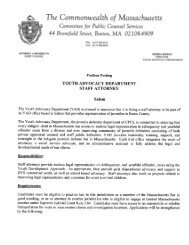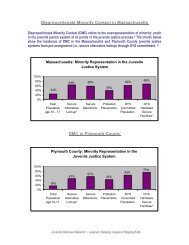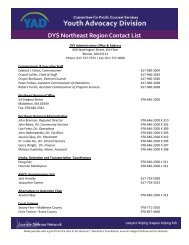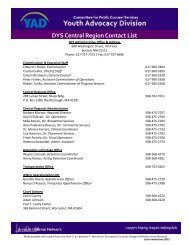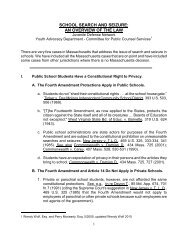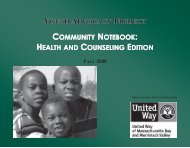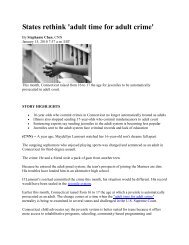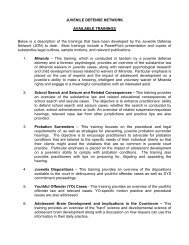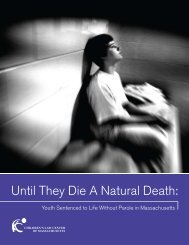Adolescent Brain Development - the Youth Advocacy Division
Adolescent Brain Development - the Youth Advocacy Division
Adolescent Brain Development - the Youth Advocacy Division
You also want an ePaper? Increase the reach of your titles
YUMPU automatically turns print PDFs into web optimized ePapers that Google loves.
<strong>Adolescent</strong> <strong>Brain</strong> <strong>Development</strong><br />
Annotated Bibliography<br />
I. Quick Reference<br />
Juvenile Defense Network, Fact Sheet<br />
Juvenile Defense Network, Relevant Cases<br />
Juvenile Defense Network, Annotated Bibliography<br />
Juvenile Defense Network, Experts List (Draft)<br />
Juvenile Defense Network, <strong>Adolescent</strong> <strong>Brain</strong> <strong>Development</strong> 2006 Mailing<br />
Coalition for Juvenile Justice, A <strong>Development</strong>al Framework for Juvenile Cases<br />
II. News Articles<br />
Stephanie Chen, States Rethink ‘Adult Time for Adult Crime’, CNN, January 15, 2010,<br />
http://www.cnn.com/2010/CRIME/01/15/connecticut.juvenile.ages/index.html (last visited Apr. 22,<br />
2010).<br />
• Discusses state efforts to raise age of automatic adult court jurisdiction, focusing on Connecticut,<br />
which changed age from 16 to 17. Also quotes psychologist Laurence Steinberg comparing <strong>the</strong><br />
teenage brain to “a car with a good accelerator but a weak brake.”<br />
Jeffrey Rosen, The <strong>Brain</strong> on <strong>the</strong> Stand, N.Y. TIMES, March 11, 2007,<br />
http://www.nytimes.com/2007/03/11/magazine/11Neurolaw.t.html (last visited Apr. 22, 2010).<br />
• Discusses <strong>the</strong> use of neuroscience in criminal law generally and explores debate over <strong>the</strong><br />
relevance of neuroscience to law. Includes interviews with a lot of <strong>the</strong> experts who are at <strong>the</strong><br />
forefront of brain science as it applies to juvenile justice. Pages 3-4 of Section III include<br />
discussion of psychologist Ruben Gur’s expert testimony and <strong>the</strong> use of “neurolaw” in Roper.<br />
Ruben C. Gur, <strong>Brain</strong> Maturation and <strong>the</strong> Execution of Juveniles, THE PENN. GAZETTE,<br />
January/February 2005.<br />
• Article written by a psychiatrist describing <strong>the</strong> use of brain research in advocating against<br />
imposition of <strong>the</strong> death penalty on older adolescents.<br />
• “The evidence now is strong that <strong>the</strong> brain does not cease to mature until <strong>the</strong> early 20s in those<br />
relevant parts that govern impulsivity, judgment, planning for <strong>the</strong> future, foresight of<br />
consequences, and o<strong>the</strong>r characteristics that make people morally culpable. Therefore, from <strong>the</strong><br />
perspective of neural development, someone under 20 should be considered to have an<br />
underdeveloped brain. Additionally, since brain development in <strong>the</strong> relevant areas goes in phases<br />
that vary in rate and is usually not complete before <strong>the</strong> early to mid-20s, <strong>the</strong>re is no way to state<br />
with any scientific reliability that an individual 17-year-old has a fully matured brain (and should<br />
be eligible for <strong>the</strong> most severe punishment), no matter how many o<strong>the</strong>rwise accurate tests and<br />
measures might be applied to him at <strong>the</strong> time of his trial for capital murder.” (*4)




